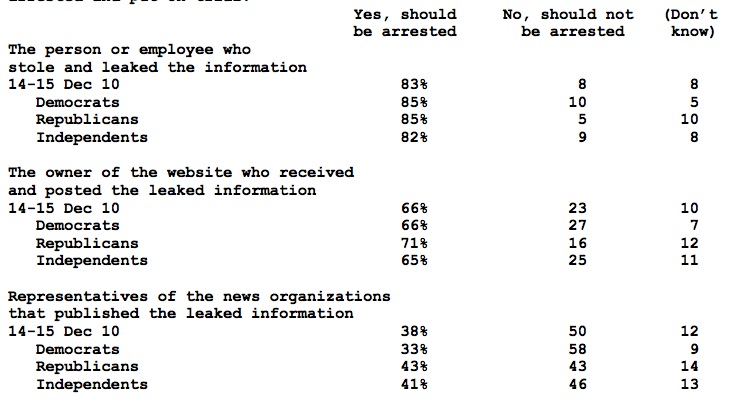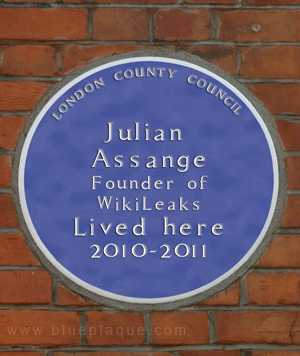Glenn Greenwald is right. We’re watching a re-run of the stenographers to power in the mainstream media picking up the signals from the political establishment (especially in the US) and obligingly parroting the party line. “The government and establishment media”, writes Greenwald,
are jointly manufacturing and disseminating an endless stream of fear-mongering falsehoods designed to depict them as scary villains threatening the security of The American People and who must therefore be stopped at any cost.
An example: the way most media outlets (even the august New York Times) have relayed the lie that WikiLeaks has “dumped” 250,000 cables into the public domain. This seems to be entirely untrue: only a tiny fraction of the trove has actually been published — and not by WikiLeaks but by the five serious newspapers that have been given access to the material. Whether by accident or design, though, the effect of endlessly repeating the 250,000 falsehood is to demonise WikiLeaks and its founder, Julian Assange. It’s all eerily reminiscent of the way in which the American public were misled in the run-up to the Iraq war — with nameless fears of terrible threats (WMDs) plus demonisation of an individual leader (then it was Saddam, now it’s Assange and Bradley Manning, the soldier accused of collecting the cables and giving them to WikiLeaks).
It’s no surprise that the US official reaction to WikiLeaks seems hysterical: it is. And contradictory: witness Greenwald’s dissection of Vice President Biden’s oscillations on the extent of the “damage” caused by the leaked cables. One minute (December 16) he’s on record saying:
I don’t think there’s any damage. I don’t think there’s any substantive damage, no. Look, some of the cables are embarrassing . . . but nothing that I’m aware of that goes to the essence of the relationship that would allow another nation to say: “they lied to me, we don’t trust them, they really are not dealing fairly with us.”
Now he’s been taped for the edition of Meet the Press going out tomorrow saying:
This guy has done things that have damaged and put in jeopardy the lives and occupations of other parts of the world. He’s made it more difficult for us to conduct our business with our allies and our friends. For example, in my meetings — you know I meet with most of these world leaders — there is a desire to meet with me alone, rather than have staff in the room: it makes things more cumbersome — so it has done damage.
Could it be, Greenwald wonders, that someone in the Attorney-General’s office quietly warned Biden that his declaration about no “substantive damage” might undermine attempts to convict Assange on espionage grounds?
But what’s really troubling is the way in which mainstream media seem to playing along with all this. Worse still, nobody seems to be paying much attention to the way that Bradley Manning is being incarcerated. The Daily Beast has an interesting report of the conditions under which he is being confined:
The conditions under which Bradley Manning is being held would traumatize anyone. He lives alone in a small cell, denied human contact. He is forced to wear shackles when outside of his cell, and when he meets with the few people allowed to visit him, they sit with a glass partition between them. The only person other than prison officials and a psychologist who has spoken to Manning face to face is his attorney, who says the extended isolation—now more than seven months of solitary confinement—is weighing on his client’s psyche.
When he was first arrested, Manning was put on suicide watch, but his status was quickly changed to “Prevention of Injury” watch (POI), and under this lesser pretense he has been forced into his life of mind-numbing tedium. His treatment is harsh, punitive and taking its toll, says Coombs.
To any detached observer, this regime constitutes a form of torture — as, in fact, the UK implicitly recognised when it eventually stopped using it on IRA prisoners in Northern Ireland. Last week the New Yorker carried a really thoughtful article about solitary confinement by Atul Gawande in which he said this:
This past year, both the Republican and the Democratic Presidential candidates came out firmly for banning torture and closing the facility in Guantánamo Bay, where hundreds of prisoners have been held in years-long isolation. Neither Barack Obama nor John McCain, however, addressed the question of whether prolonged solitary confinement is torture. For a Presidential candidate, no less than for the prison commissioner, this would have been political suicide. The simple truth is that public sentiment in America is the reason that solitary confinement has exploded in this country, even as other Western nations have taken steps to reduce it. This is the dark side of American exceptionalism. With little concern or demurral, we have consigned tens of thousands of our own citizens to conditions that horrified our highest court a century ago. Our willingness to discard these standards for American prisoners made it easy to discard the Geneva Conventions prohibiting similar treatment of foreign prisoners of war, to the detriment of America’s moral stature in the world. In much the same way that a previous generation of Americans countenanced legalized segregation, ours has countenanced legalized torture. And there is no clearer manifestation of this than our routine use of solitary confinement—on our own people, in our own communities, in a supermax prison, for example, that is a thirty-minute drive from my door. [Emphasis added.]
What’s strange and disturbing to an observer on this side of the Atlantic is watching the Obama, administration heading down the same moral cul-de-sac as that traversed by his predecessor.



